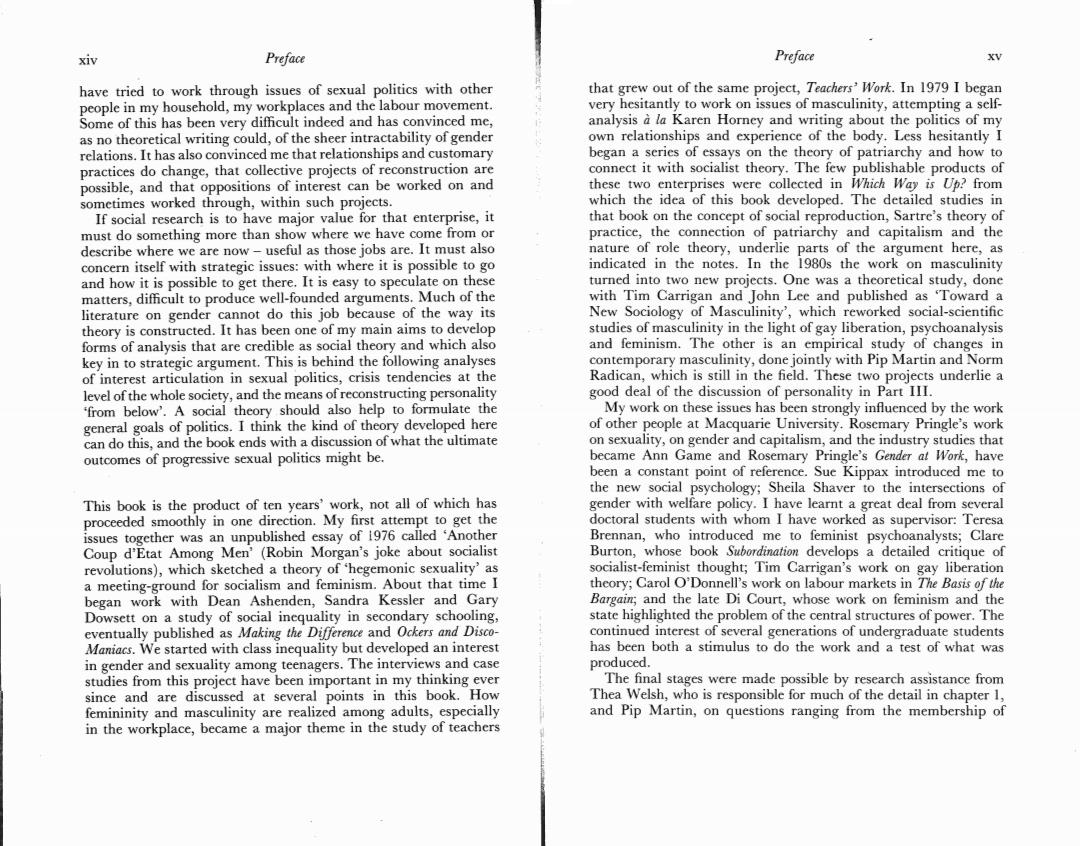正在加载图片...

xiv Preface Preface XV have tried to work through issues of sexual politics with other that grew out of the same project,Teachers'Work.In 1979 I began people in my household,my workplaces and the labour movement. very hesitantly to work on issues of masculinity,attempting a self- Some of this has been very difficult indeed and has convinced me, analysis a la Karen Horney and writing about the politics of my as no theoretical writing could,of the sheer intractability of gender own relationships and experience of the body.Less hesitantly I relations.It has also convinced me that relationships and customary began a series of essays on the theory of patriarchy and how to practices do change,that collective projects of reconstruction are connect it with socialist theory.The few publishable products of possible,and that oppositions of interest can be worked on and these two enterprises were collected in Which Way is Up?from sometimes worked through,within such projects. which the idea of this book developed.The detailed studies in If social research is to have major value for that enterprise,it that book on the concept of social reproduction,Sartre's theory of must do something more than show where we have come from or practice,the connection of patriarchy and capitalism and the describe where we are now-useful as those jobs are.It must also nature of role theory,underlie parts of the argument here,as concern itself with strategic issues:with where it is possible to go indicated in the notes.In the 1980s the work on masculinity and how it is possible to get there.It is easy to speculate on these turned into two new projects.One was a theoretical study,done matters,difficult to produce well-founded arguments.Much of the with Tim Carrigan and John Lee and published as 'Toward a literature on gender cannot do this job because of the way its New Sociology of Masculinity',which reworked social-scientific theory is constructed.It has been one of my main aims to develop studies of masculinity in the light of gay liberation,psychoanalysis forms of analysis that are credible as social theory and which also and feminism.The other is an empirical study of changes in key in to strategic argument.This is behind the following analyses contemporary masculinity,done jointly with Pip Martin and Norm of interest articulation in sexual politics,crisis tendencies at the Radican,which is still in the field.These two projects underlie a level of the whole society,and the means of reconstructing personality good deal of the discussion of personality in Part III. 'from below'.A social theory should also help to formulate the My work on these issues has been strongly influenced by the work general goals of politics.I think the kind of theory developed here of other people at Macquarie University.Rosemary Pringle's work can do this,and the book ends with a discussion of what the ultimate on sexuality,on gender and capitalism,and the industry studies that outcomes of progressive sexual politics might be. became Ann Game and Rosemary Pringle's Gender at Work,have been a constant point of reference.Sue Kippax introduced me to the new social psychology;Sheila Shaver to the intersections of This book is the product of ten years'work,not all of which has gender with welfare policy.I have learnt a great deal from several proceeded smoothly in one direction.My first attempt to get the doctoral students with whom I have worked as supervisor:Teresa issues together was an unpublished essay of 1976 called 'Another Brennan,who introduced me to feminist psychoanalysts;Clare Coup d'Etat Among Men'(Robin Morgan's joke about socialist Burton,whose book Subordination develops a detailed critique of revolutions),which sketched a theory of'hegemonic sexuality'as socialist-feminist thought;Tim Carrigan's work on gay liberation a meeting-ground for socialism and feminism.About that time I theory;Carol O'Donnell's work on labour markets in The Basis of the began work with Dean Ashenden,Sandra Kessler and Gary Bargain;and the late Di Court,whose work on feminism and the Dowsett on a study of social inequality in secondary schooling, state highlighted the problem of the central structures of power.The eventually published as Making the Difference and Ockers and Disco- continued interest of several generations of undergraduate students Maniacs.We started with class inequality but developed an interest has been both a stimulus to do the work and a test of what was in gender and sexuality among teenagers.The interviews and case produced. studies from this project have been important in my thinking ever The final stages were made possible by research assistance from since and are discussed at several points in this book.How Thea Welsh,who is responsible for much of the detail in chapter 1, femininity and masculinity are realized among adults,especially and Pip Martin,on questions ranging from the membership of in the workplace,became a major theme in the study of teachers